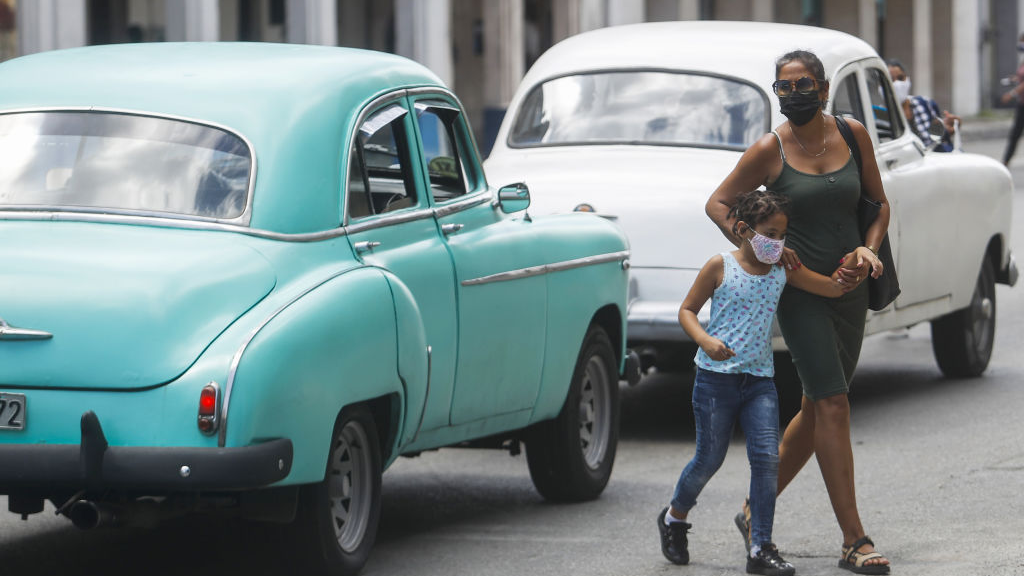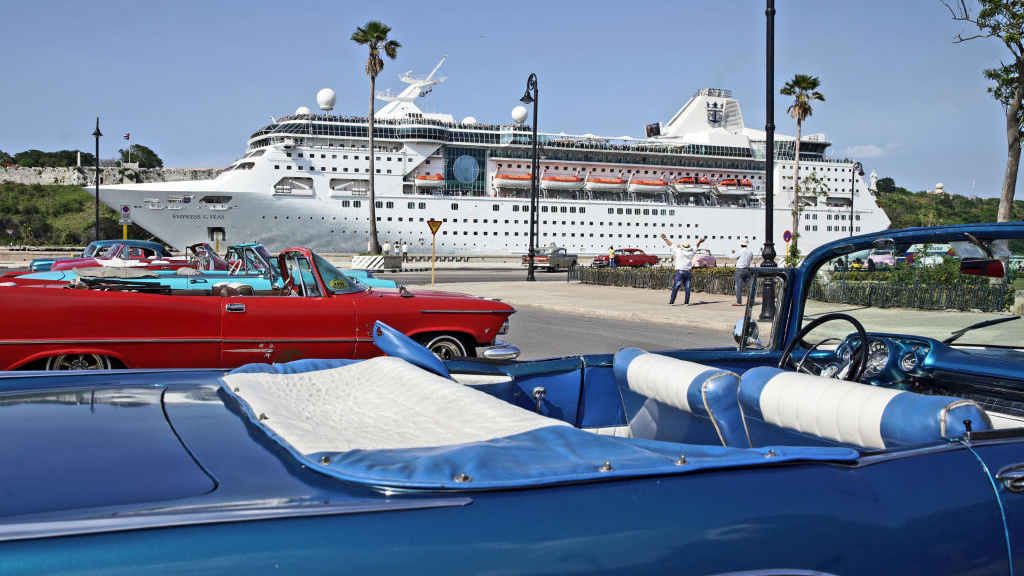
Mother and daughter walk by the side of two classic cars in one of the streets of Havana, Cuba, July 15, 2021. /Getty
Mother and daughter walk by the side of two classic cars in one of the streets of Havana, Cuba, July 15, 2021. /Getty
Editor's note: Danny Haiphong is a journalist based in the United States and activist with the No Cold War international campaign. The article reflects the author's opinions and not necessarily the views of CGTN.
SOSUSA trended for a short period on Twitter beginning on July 17. Champions of the hashtag highlighted the U.S.'s police brutality against protesters and a host of other crimes against humanity. The trending hashtag came in response to U.S.-backed protests against the Cuban government. From Miami to Washington D.C., hundreds of protesters have feigned concern for "freedom" in Cuba. Many of them explicitly call for regime change.
The protests said nothing of rampant U.S.-based police violence, rising poverty, or that close to 1 million people in the U.S. are estimated to have died of COVID-19. That's because the recent protests are a carefully orchestrated campaign to manufacture consent for the U.S.'s six decade-long embargo at the root of Cuba's economic problems. The U.S. media has played an outsized role in fueling the unrest by censoring far larger pro-government protests in Cuba. The mayor of Miami even called for U.S. airstrikes in Cuba on Fox News.
The truth is that Cuba needs solidarity, not saving. Cuba has been punished by the U.S.'s cruel blockade for more than 60 years for simply asserting its self-determination. Since 1962, Cuba has accumulated over $147 billion in economic damages. Under the Donald Trump administration, sanctions were tightened even further. Cuba's capacity to fight the COVID-19 pandemic was thus hampered by a lack of market access to ventilators, masks, syringes, goggles, and other supplies necessary to reduce viral transmission. U.S. President Joe Biden has held firm to Trump's policy on Cuba and ignored the international call supported by every country but two (U.S. and Israel) to end the embargo.
Still, the allegation that Cuba has failed to address COVID-19 is far from truthful. Cuba's COVID-19 response is one of the most respected in the world. The percentage of people who have died of COVID-19 in Cuba is well under 1 percent. Cuba has produced several vaccines and plans to vaccinate 70 percent of its population by August. Despite the enormity of the public health crisis, tens of thousands of Cuban doctors have been sent to all corners of the world to aid in the global fight against the pandemic.
Cuba demonstrates in a myriad of ways how socialism places the needs of people over profit. More than two-thirds of the national budget is dedicated to social development in the areas of healthcare, education, housing, scientific research, culture, and social security. Cuba's model of universal education has been hailed by UNESCO as of one the best in the region. Healthcare in Cuba is free to all and has also gained international prestige for its numerous achievements, including the development of a lung cancer vaccine and the eradication of mother-child transmission of HIV-AIDS. Cubans live longer and infant mortality is lower than in the United States.

A Cuban taxi driver waves goodbye and U.S. vintage cars are parked empty as the Empress of the Sea of Royal Caribbean International leaves the harbor of Havana, Cuba, June 5, 2019. /Getty
A Cuban taxi driver waves goodbye and U.S. vintage cars are parked empty as the Empress of the Sea of Royal Caribbean International leaves the harbor of Havana, Cuba, June 5, 2019. /Getty
The U.S. embargo is the principal reason for the island nation's economic woes, not the Cuban government. Yet not even the most progressive U.S. representatives have taken a firm stance against aggression toward Cuba. Congresswoman Alexandria Ocasio-Cortez published a statement affirming the "rights" of protesters while simultaneously calling for the end of the U.S. blockade. The willingness to stand on both sides of this issue indicates lack of seriousness that risks strengthening U.S. aggression. To paraphrase Howard Zinn, one cannot be neutral on a moving train.
The U.S. addiction to interfering in the internal affairs of nations abroad is buttressed by American exceptionalism, or the belief that the U.S. is superior to the rest of the world. American exceptionalism at this stage of U.S. development has very little to do with reality. Police departments receive more funding than most of the world's militaries and regularly shoot at protesters and African American communities. Healthcare has been privatized to the point of paralysis, leading to high levels of medical debt and a declining life expectancy. Nearly 50 percent of the U.S. is living in or near poverty. Rather than invest in human need, the U.S. leads the world in total prisoners and military spending.
The hashtag SOSUSA shines a light on U.S. hypocrisy. U.S. government officials are verifiably guilty of the crimes that they allege of other countries. Social neglect and state violence are foundational to U.S. capitalism. So is white supremacy. Some have called the U.S. a failed state, but the truth is that the system is working exactly as it was designed. As a dictatorship of capital, U.S. elites view the downtrodden as having no rights that they are bound to respect.
In this time of global crises, Cuba deserves staunch defense from external aggression. Progressive forces the world over must continue to oppose the U.S.'s embargo of Cuba. SOSUSA should serve as a call to action for the development of a multipolar order that closes the chapter on the U.S. imperialism and its unilateral threats against Cuba and countless other nations' right to peaceful development.
(If you want to contribute and have specific expertise, please contact us at opinions@cgtn.com.)

